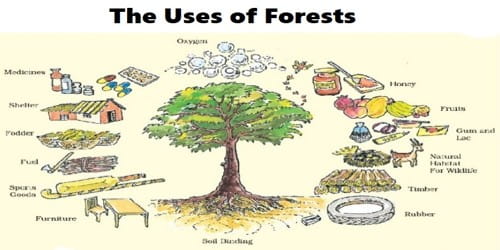The Uses of Forests
People were food gatherers and depended on the forest for all their needs; food, clothing, and shelter. Forests and the many varying trees of which they are composed have since the very earliest days played an important part in the life of mankind. People began life on this planet as forest dwellers. It is because of this that men have realized their value and have taken steps to preserve them and to prevent their wanton and useless destruction. But they continued to depend on forests to meet a lot of their needs. Even today people depend on the forest for paper, timber, fuelwood, medicine, and fodder.
From the primitive days of the wigman, the house on stilts or the African but, wood has been the basic material used for men’s housing to provide shelter from the animals. The wigwam and the African hut were built around a frame of timber. Softwoods of all kinds are used for frames and doors and a variety of hardwoods for furniture. Some of the wood is converted to charcoal and used for cooking.
From the earliest times too, wood has played a large part in transport. A rolling tree trunk, very probably showed the primitive man the possible use of the wheel, perhaps as important a discovery as that of fire. In the earliest days of the automobile, wood was essential in its construction, but even before that, trishaws, carts, carriages and wagons, all made of timber enabled man to move from place to place overland.
Another very important use of forests is a modern one. This is the cutting up of logs and timber for use in the making of paper, particularly the kind of paper on which our daily newspapers are printed. The logs of wood, when cut, are ground up by hue machines and are turned into wood pulp.
As well as producing timber, certain forests provide important oils such as turpentine from the pine forests of North America or palm oil from the palm forests. Olive oil is produced from the olive tree. There are other products too. Such products are Timber, Grasses, Cane, Medicinal use, Fruit, Floss, Fibre, Essential oils, and Bamboo.
Additionally, forests prevent soil erosion on Earth. They protect it from winds blowing it away and form water washing it away. There are trees that are present in the forests that bind the soil strongly from the roots. Many wild animals and small insects find shelter under the protecting branches of forest trees. A wide variety of climbing shrubs, flowers and creepers are also protected by them. Thus, this results in soil being prevented from erosion.
Forests help in maintaining the oxygen and temperature levels of the atmosphere. It is because of the importance of forests that they should be preserved. Furthermore, forests help in maintaining the oxygen cycle on the planet Earth. In 1919, after the first great war, the wood shortage in Britain was very acute, because so much had been used in the war effort. The Forestry Commission was, therefore, set up. This is a body that buys old woods and land, that is at present bare and turns them into modern forests using the latest scientific knowledge and equipment to help in this purpose.
Information Source:
















